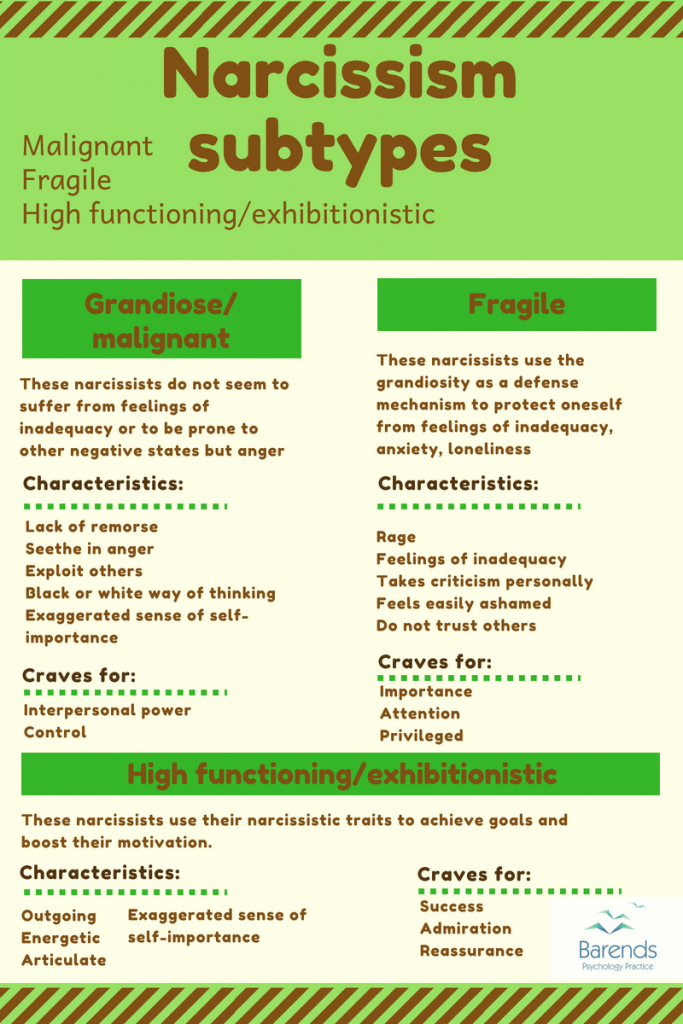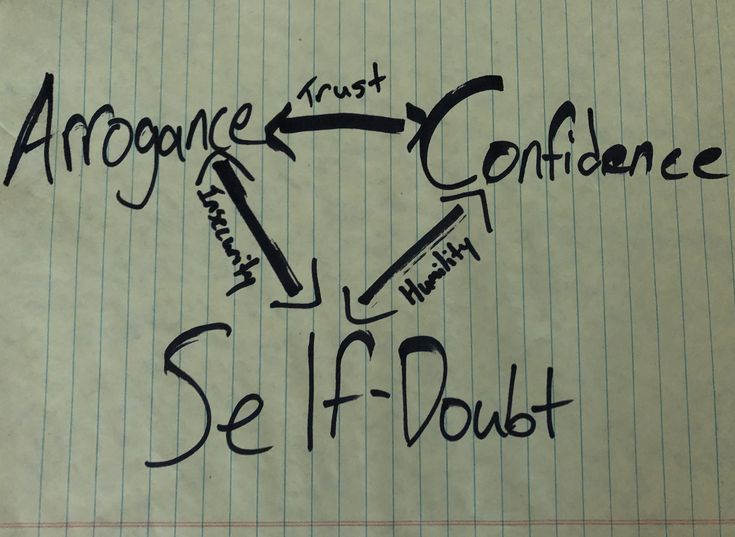Coping with narcissists
What Works and What Doesn’t
Written by Kara Mayer Robinson
You may wonder if your partner, co-worker, or family member is a narcissist. While many people have what doctors call narcissistic traits, like self-importance and entitlement (thinking they’re owed something), people diagnosed with narcissistic personality disorder can be a bigger challenge.
“Living with a narcissist requires a different or more advanced emotional skill set,” says Kimberly Perlin, a licensed clinical social worker Towson, MD. She specializes in helping women in relationships with narcissists and also treats narcissists.
Having a narcissist in your life can be frustrating and emotionally challenging. Your relationship may revolve around them. You may feel judged and exhausted by their demands.
When she was a child, Carla Marie Manly, PhD, a clinical psychologist in Santa Rosa, CA, didn’t realize her older sibling was a narcissist. “Growing up with this highly controlling person was extremely challenging,” she says. “It was only in my adult years that I came to realize this sibling was a deeply troubled narcissist.”
How to Spot a Narcissist
Narcissists have a strong sense of grandiosity. That means they think they’re more important than others and often seek out admiration.
One of Perlin’s clients is a perfect example. “A client I worked with for years terminated therapy with me when he saw my new website and was insulted that the website didn’t talk about him,” she says.
Narcissists often:
- Have a strong sense of grandiosity (they have high levels of self-esteem, self-importance, self-confidence, and often feel like they’re superior to others)
- Are arrogant
- Take advantage of others to get what they want
- Believe they’re unique or special
- Exaggerate achievements and talents
- Need constant admiration
- Feel envy toward others
- Believe others envy them
- Lack empathy
- Are obsessed with fantasies of brilliance, power, or success
- Have a sense of entitlement
Narcissists and Relationships
Manly learned a lot about narcissists from her older sibling and her experiences working with them.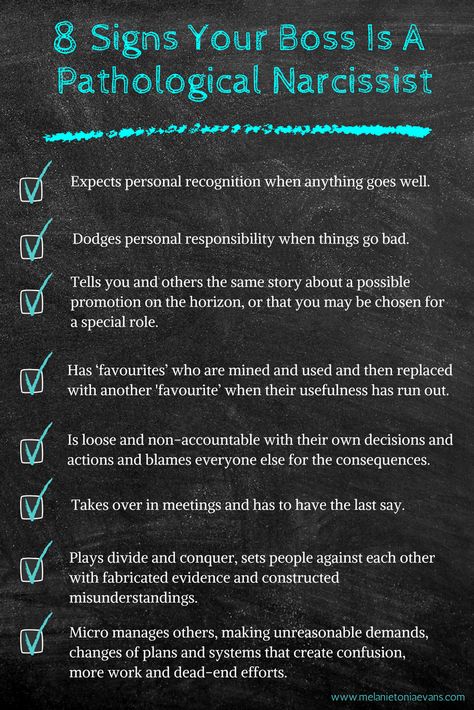 “I’ve learned that narcissists are the focus of their own lives. They often believe they’re perfect and blame others for issues that arise at work, home, or social situations.” she says.
“I’ve learned that narcissists are the focus of their own lives. They often believe they’re perfect and blame others for issues that arise at work, home, or social situations.” she says.
Narcissists may do whatever it takes to get what they want. They generally don’t feel compassion and can’t connect intimately with others, even the people who are closest to them.
At work, a narcissist may seek admiration, even if it hurts others. They may take credit for other people’s work, undermine co-workers, or change their behavior to get approval from higher-level people. They may seem friendly and hard-working, but there’s often more to it than meets the eye.
At home, a narcissist can impact the whole family. If you’re in an intimate relationship with a narcissist, they may be highly critical of you, distant, and dismissive. You could feel invisible, disrespected, and lonely. If you’re a child of a narcissist, you may have been neglected or abused.
Sometimes it’s best to cut ties with a narcissist, especially if they’re abusive.
“For my own mental health, I’ve chosen to step back from investing in a personal relationship with my sibling,” Manly says. She accepts that her sibling doesn’t see their behavior as a problem and since her sibling has no desire for self-growth, an ongoing relationship will only lead to more frustration.
If you’re in a relationship with a narcissist, expect it to be challenging. “Buckle up, it will be a very bumpy ride,” says Forrest Talley, PhD, a clinical psychologist in Folsom, CA. “It will be an extraordinarily taxing relationship.”
What to Do With a Narcissist
Take these steps to handle a narcissist:
Educateyourself. Find out more about the disorder. It can help you understand the narcissist’s strengths and weaknesses and learn how to handle them better. Knowing who they are may also allow you to accept the situation for what it is and have realistic expectations.
Create boundaries. Be clear about your boundaries. It may upset or disappoint the narcissist, but that’s OK. Remember, it’s not your job to control that person’s emotions, Perlin says.
It may upset or disappoint the narcissist, but that’s OK. Remember, it’s not your job to control that person’s emotions, Perlin says.
Speak up for yourself. When you need something, be clear and concise. “Make sure they understand your request, Perlin says.
Watch your wording. Narcissists don’t take constructive criticism well, Manly says. Try to make comments in careful, positive ways.
Stay calm. Try not to react if they try to pick a fight or gaslight you (making you doubt your own reality). If they lash out, think of them as a 3-year-old who feels rejected because their parent sets a bedtime, Talley says.
Create a support system. Living with a narcissist can lead to feelings of insecurity, confusion, and self-doubt. “Make sure you have a core group of people in your life that can support you,” Talley says.
Bring in a counselor. Therapy won’t cure your partner’s narcissism, but it may help you work certain things out. A counselor can show you ways to approach problem-solving with the narcissist.
A counselor can show you ways to approach problem-solving with the narcissist.
What Not to Do With a Narcissist
Certain things may trigger problems with a narcissist, so it’s best to avoid them.
Don’t argue or confront. Manly finds it’s best not to confront a narcissist directly. As difficult as it may be to constantly tiptoe around them, it can be better to manage their need to feel in charge.
Don’t try to direct them. Narcissists like to have control and often fear losing it. “Efforts to lead or instruct a narcissist will often fail,” Manly says.
Don’t expect them to see your point of view. Narcissists don’t like to admit when they’re wrong or that they’re unlovable, so trying to make them see things your way could backfire.
Don’t expect deep, meaningful communication. “Narcissists have very little empathy, so honest, heartfelt communication often doesn’t get through and can even create an angry outburst or shutdown response,” Manly says.
Don’t go over past issues. Don’t try to make them see a long line of behavior dating back years -- or how they’re just like their father, for example, Perlin says. Instead, stay in the present when you express requests or hurt feelings.
People with narcissistic personality disorder usually don’t change, so keep that in mind. Even if you learn to manage your relationship better, it probably won’t ever be a healthy relationship.
13 Tips for How to Deal With a Narcissist
Skip to contentPublished: September 24, 2021 Updated: November 24, 2022
Published: 09/24/2021 Updated: 11/24/2022
A narcissist has an inflated self-image, constant need for praise, and lack of empathy.1 They are often deceptive and have profound insecurities. It’s estimated that about 5% of the population has narcissistic personality disorder (NPD),2 so it’s likely that you’ve had to deal with one, whether a family member, friend, or coworker. It’s often best to remove yourself from a relationship with a narcissist, but sometimes that’s impossible.
It’s often best to remove yourself from a relationship with a narcissist, but sometimes that’s impossible.
You don’t have to deal a narcissist’s abuse on your own. BetterHelp has over 20,000 licensed therapists who provide convenient and affordable online therapy. BetterHelp starts at $60 per week. Complete a brief questionnaire and get matched with the right therapist for you.
Choosing Therapy partners with leading mental health companies and is compensated for marketing by BetterHelp
Visit BetterHelp
A narcissist can leave you feeling worthless, devalued, and unappreciated. Dealing with a narcissist, whether it’s a family member, friend, or boss, takes a toll on your self-esteem and can leave you broken and dismayed. It’s a never-ending cycle of manipulations that get worse over time.
Someone might be a narcissist if they:
- Attempt to isolate you
- Tell you how to feel or act
- Challenge your reality or gaslight you
- Blame you for everything that goes wrong
- Monitor your friends and whereabouts
- Project their imperfections onto you
- Discount your opinions and needs
Here are 13 tips for dealing with a narcissist:
1. Determine What Type of Narcissist You’re Dealing With
There are two major types of narcissists: grandiose and vulnerable.3The grandiose narcissist is highly confident, attention seeking, yet flexible. The best way to deal with grandiose narcissists is to get them on your team early and give them a key role.
Vulnerable narcissists, on the other hand, are passive aggressive and have low self-esteem. Grandiose narcissists are outgoing while vulnerable narcissists are more introverted. Provide reassurance to vulnerable narcissists to keep them on task and their emotions in check.
2. Respond Instead of Reacting
It is tempting to react to the narcissist’s manipulative tactics with shock, disbelief, anger and even pain, but these reactions give much needed supply to the narcissist.
In responding to narcissists, focus on the issue at hand and do not allow for deflection or projection. Bringing the attention back to the issue removes the narcissist’s ability to monopolize the conversation or change the subject. Be intentional and mindful of your words when responding to a narcissist, and learn about phrases that can help disarm the narcissist when they try to engage.
Be intentional and mindful of your words when responding to a narcissist, and learn about phrases that can help disarm the narcissist when they try to engage.
3. Avoid Direct Confrontation When Possible
Since narcissists are hyper-sensitive to criticism, calling them out is rarely helpful and can often lead to them spiraling out of control. You may even trigger their narcissistic rage. Instead, if you do need to give any negative feedback, try to frame it as much like a compliment as much as possible and only inject small doses of feedback.
4. Demand Action Over Promises
Narcissists are great at making plans for the future but rarely keep their promises. The best method to hold narcissists accountable is to confront the deception head on. Remind them of their promise and how everyone will be looking forward to seeing them (playing to their ego). Do not fill any request until your request is met.
5. Put Your Attention Back on Yourself
Narcissists thrive on attention—no matter how much you give, it will never be enough for a narcissist.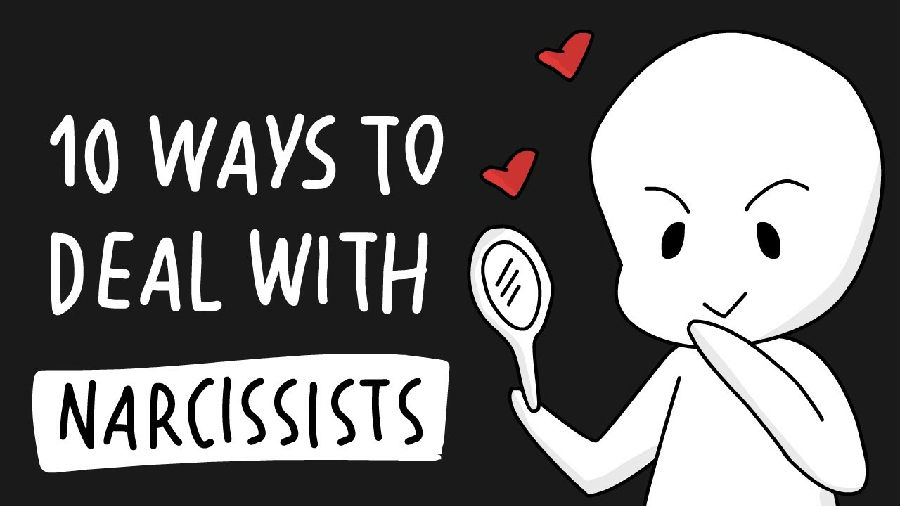 But you can break the spell by focusing on your needs, goals, and desires. Remember that you are not defined by their perception. Take note of your strengths, use self-affirmations to boost your confidence, and make sure you have time for self care.
But you can break the spell by focusing on your needs, goals, and desires. Remember that you are not defined by their perception. Take note of your strengths, use self-affirmations to boost your confidence, and make sure you have time for self care.
6. Keep the Conversation Brief
Narcissists are very good at over-talking and controlling the conversation. This form of manipulation gives them leverage, as they don’t leave time for you to get your point across.
Whenever possible, keep the conversation brief and focused, and redirect the conversation as much as possible. When you see that the conversation remains one-sided, end it and move on. In the end, it’s important to recognize that most situations with a narcissist remain unresolved.
7. Ask Them If Their Request Sounds Responsible
Narcissists can appear out of touch with reality, display abnormal and sometimes dangerous behaviors, “play games” with your emotions, or make suggestions that seem ridiculous and far-fetched. For example, they might ask you to co-sign on a car although they are unemployed, or buy a house with them even though they only work part-time. The question “Are narcissists dangerous?” can be a legitimate concern, so appropriate caution should be considered.
For example, they might ask you to co-sign on a car although they are unemployed, or buy a house with them even though they only work part-time. The question “Are narcissists dangerous?” can be a legitimate concern, so appropriate caution should be considered.
When responding to these irresponsible requests, ask the narcissist if what they are saying or doing makes sense. Create similar scenarios and ask how they would respond, or remind them of a time when they disagreed with a similar situation or request. Sometimes, giving a reasonable suggestion or alternative can persuade the narcissist to rethink their irrational requests.
8. Set & Maintain Firm Boundaries
People with Narcissistic Personality Disorder are habitual boundary-crossers. They have no problem bending and breaking rules because rules don’t apply to them. However, they hold their own boundaries near and dear.
When involved with these individuals, make sure that you set boundaries and vigorously maintain them. State what you will and will not accept and don’t falter. Any crack in your foundation is an invitation to violate and push your boundaries. Stand up for yourself, restate your boundary, acknowledge their unacceptable behaviors, and push back against their violations.
State what you will and will not accept and don’t falter. Any crack in your foundation is an invitation to violate and push your boundaries. Stand up for yourself, restate your boundary, acknowledge their unacceptable behaviors, and push back against their violations.
9. Remind Yourself That You’re Not at Fault
A narcissist may try to blame you for anything that they view as not going their way. Remember that your boundaries are important, including limiting what you are responsible for in their life. When they try to push the blame onto you, you don’t have to accept it.
10. Gently Point Out Their Behavior
Narcissists are usually unaware of the hurt they inflict on others. To them, their behavior is normal, and they will blame others for their failures and mistakes.
Gently point out and draw attention to the undesired behavior. As narcissists do not like to be seen in a negative light, they will quickly adjust their behavior in order to be perceived as positive.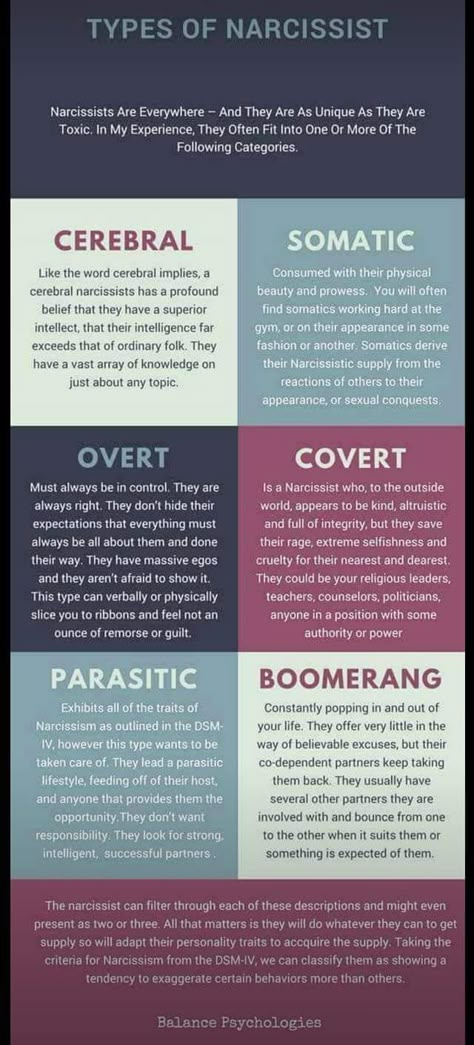
11. If You Have to Be Around Them, Act Interested
If you’re dealing with a narcissistic boss or authority figure, sometimes it’s best to pretend that you’re fascinated. You do not have to agree or disagree. You can respond with “That sounds interesting,” “Tell me more about that,” or “How do you plan to implement that?” If it is a narcissistic coworker, you can tell them you are extremely busy, or say, “I would love to talk but I must get this done by the end of the day.”
12. Recognize When You Need Help
Because narcissistic abuse can be subtle, it can be hard to determine if you are a victim. It can be easy to fall into a cycle of narcissistic abuse and feel trapped without a way out. Signs that you may need to seek professional help vary from relationship to relationship, but if you are experiencing self-doubt or you question your worth, you may need to seek therapy from someone who is trained in identifying and helping those who suffer from narcissistic abuse.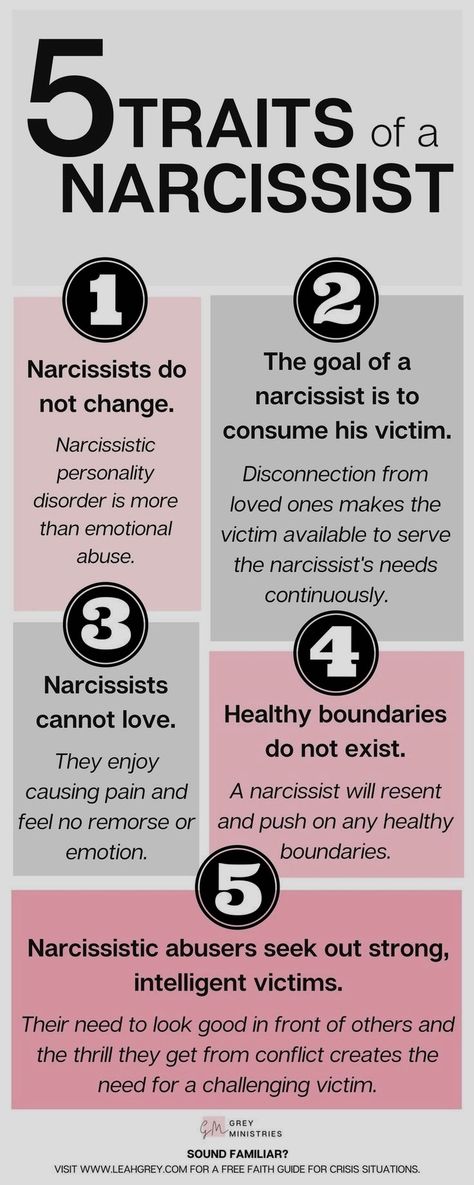
Recovery can be a long process, and finding a mental health professional can take time, but it is worth the effort to start your healing journey.
13. Know When It Is Time to Leave
Narcissists are skilled manipulators and masters of deception. Tactics such as gaslighting, belittling, love bombing, and projection are tools used to narcissistic relationship patterns to try to maintain and control the relationship even when you’re working to end it.
If you feel out of sorts, confused, or can’t find the words to explain what is happening, it may be time to leave the relationship. It is not worth losing sight of yourself or your self-worth to stay in a relationship that is not meeting your needs. Narcissistic abuse syndrome is real and can have lasting impacts on a person – avoid it by knowing when to leave.
Not every relationship with a narcissist has the same dynamics. Those can change depending on the situation…
- If you’re in a romantic relationship with a narcissist, they may leave you constantly feeling like you’re “not good enough” and may gaslight you into staying in the relationship
- If you have a narcissistic mother or mother-in-law, she may compete with you, compare herself to you, or constantly present herself as a victim
- If you’re dealing with a narcissistic boss, they may act entitled and demanding, and never give you any positive feedback (but expect it from you)
- If you know a communal narcissist, they may believe themself to be the best listener and most giving person, while really keeping the attention on themself as much as possible
Help For Narcissistic Abuse
Individual Therapy – Get personalized help with recovering from narcissistic abuse from a licensed therapist.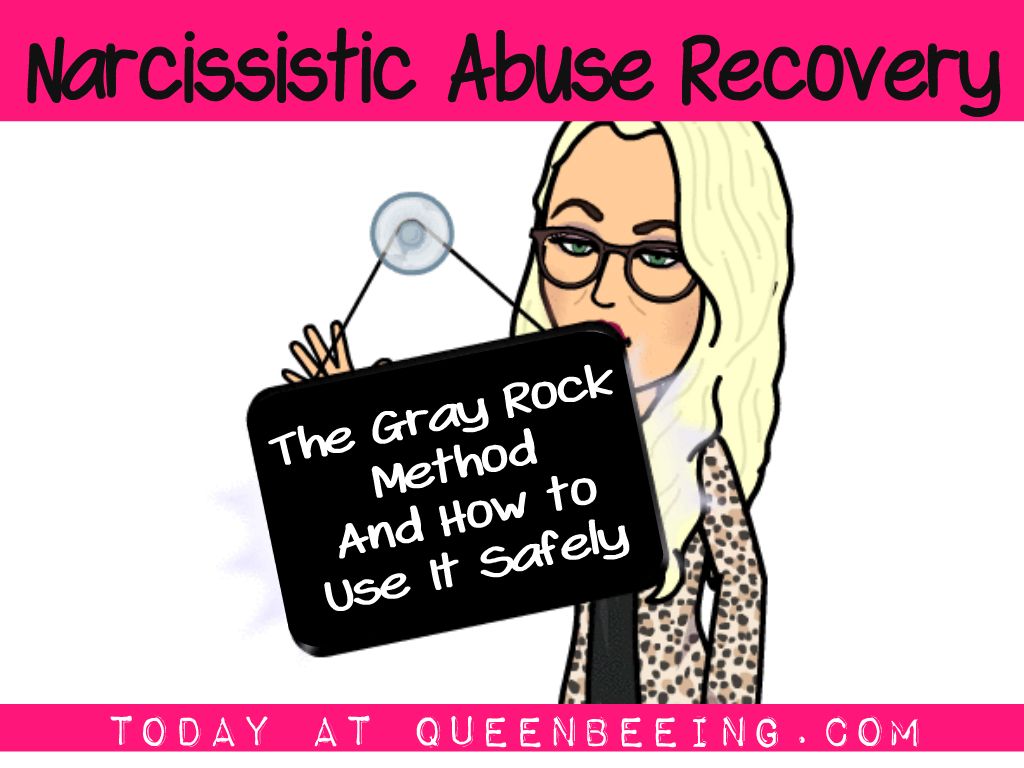 BetterHelp offers online sessions by video or text. Try BetterHelp
BetterHelp offers online sessions by video or text. Try BetterHelp
Support Groups – You are not alone in dealing with a narcissist. Sesh offers over 100 different support groups per month, with at least once a week focused on narcissism. First Month Free
Books On Narcissism – See our handpicked selection of Narcissism Books List
Choosing Therapy partners with leading mental health companies and is compensated for marketing by BetterHelp and Sesh.
What NOT to Do When Dealing With a Narcissist
Figuring out how to handle a narcissist can feel like preparing for battle. You can never get your point across without an argument. If you do make a valid point, it is met with criticism or they will blame others.
Here’s are five things to avoid when dealing with a narcissist:
1. Telling Them They’re WrongNarcissists are never wrong. They will hold their stance even when presented with facts that discredit their point. They will find ways to poke holes in your evidence. However, you can tell a narcissist they are wrong without saying “you’re wrong.” For example, “You make a good point, but I see things differently” or “I don’t recall that.”
They will find ways to poke holes in your evidence. However, you can tell a narcissist they are wrong without saying “you’re wrong.” For example, “You make a good point, but I see things differently” or “I don’t recall that.”
Remember your boundaries—but know that they won’t be respected by the narcissist. Be prepared for them to ask for more than what you’re willing to give, and be prepared to hold your ground.
3. Calling Them a LiarNarcissists love telling tall tales regarding their accomplishments. Any challenge of their actions or attempts to deflate their ego puts them on guard, and pressing your point will only escalate the situation. Instead, try my personal favorite phrase: “It’s your story to tell.” Using humor is also a useful method.
4. Asking, “What’s the matter with you?”Let’s be honest, no one likes to be asked this question. It is off-putting and throws you into defense mode.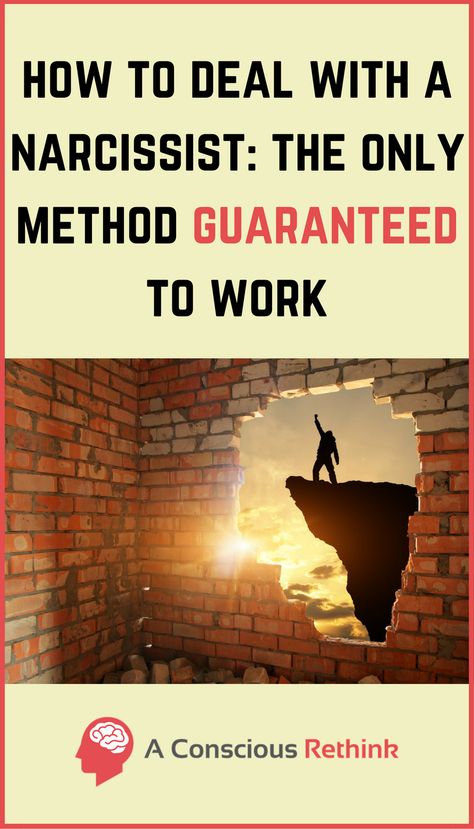 Even more so for a narcissist as they are “perfect in every way.” Their fragile egos and low self-esteem are at the heart of their narcissism.
Even more so for a narcissist as they are “perfect in every way.” Their fragile egos and low self-esteem are at the heart of their narcissism.
Narcissists truly want to be understood and loved, so choosing your words carefully will go a long way in this situation. Be compassionate. Ask if they need to talk or vent.
5. Telling Them How to Do SomethingNarcissists view any form of criticism as a personal attack. What they hear is that you are better than them. A narcissist will shut down, tell you to do it yourself, or say, “Don’t ask me for anything.” They will feel like they have done something wrong – which crushes their self-esteem.
Teamwork is your greatest asset in this scenario. Do not suggest that there is a better way but a different way. You can also say, “I didn’t know that you could do it that way. I usually …”
Final Thoughts on Dealing With a Narcissist
Dealing with a narcissist can be overwhelming and life changing, but understand that you are not alone and that there is a community of survivors of narcissistic abuse. It is crucial that you seek professional help if the abuse is extensive and long-lasting or if you feel that you are unable to recover and move on. Your ability to recover is dependent on understanding what you have experienced and finding ways for healing, self-care, and self-love.
Additional Resources
Education is just the first step on our path to improved mental health and emotional wellness. To help our readers take the next step in their journey, Choosing Therapy has partnered with leaders in mental health and wellness. Choosing Therapy may be compensated for marketing by the companies mentioned below.
BetterHelp (Online Therapy) – BetterHelp has over 20,000 licensed therapists who provide convenient and affordable online therapy. BetterHelp starts at $60 per week. Complete a brief questionnaire and get matched with the right therapist for you. Get Started
Online-Therapy.com – The Online-Therapy. com standard plan includes a weekly 45 minute video session, unlimited text messaging between sessions, and self-guided activities like journaling. Recently, they added Yoga videos. Get Started
com standard plan includes a weekly 45 minute video session, unlimited text messaging between sessions, and self-guided activities like journaling. Recently, they added Yoga videos. Get Started
Mindfulness.com (App) – Mindfulness and meditation can change your life. In a few minutes a day with Mindfulness.com, you can start developing mindfulness and meditation skills. Free Trial
Choosing Therapy’s Directory – Find an experienced therapist who is committed to your wellbeing. You can search for a therapist by specialty, availability, insurance, and affordability. Therapist profiles and introductory videos provide insight into the therapist’s personality so you find the right fit. Find a therapist today.
Choosing Therapy partners with leading mental health companies and is compensated for marketing by BetterHelp, Online-Therapy.com, and Mindfulness.com
4 sources
Choosing Therapy strives to provide our readers with mental health content that is accurate and actionable. We have high standards for what can be cited within our articles. Acceptable sources include government agencies, universities and colleges, scholarly journals, industry and professional associations, and other high-integrity sources of mental health journalism. Learn more by reviewing our full editorial policy.
We have high standards for what can be cited within our articles. Acceptable sources include government agencies, universities and colleges, scholarly journals, industry and professional associations, and other high-integrity sources of mental health journalism. Learn more by reviewing our full editorial policy.
-
American Psychiatric Association. (2013). Diagnostic and statistical manual of mental disorders (5th ed.). Arlington, VA: Author.
-
Mitra P, Fluyau D. Narcissistic Personality Disorder. [Updated 2021 May 18]. In: StatPearls [Internet]. Treasure Island (FL): StatPearls Publishing; 2021 Jan-. Available from: https://www.ncbi.nlm.nih.gov/books/NBK556001/
-
Pipich, M. (2020). Narcissistic Personality Disorder: Signs, symptoms, & treatments. ChoosingTherapy.com.
-
Egan, V., Chan, S., & Shorter, G. W. (2014). The Dark Triad, happiness and subjective well-being. Personality and Individual Differences, 6717-22.
 doi:10.1016/j.paid.2014.01.004
doi:10.1016/j.paid.2014.01.004
update history
We regularly update the articles on ChoosingTherapy.com to ensure we continue to reflect scientific consensus on the topics we cover, to incorporate new research into our articles, and to better answer our audience’s questions. When our content undergoes a significant revision, we summarize the changes that were made and the date on which they occurred. We also record the authors and medical reviewers who contributed to previous versions of the article. Read more about our editorial policies here.
-
Originally Published: December 18, 2020
Original Author: Nakpangi Thomas, PhD, LPC, TITC-CT
Original Medical Reviewer: Benjamin Troy, MD -
Updated: September 24, 2021
Author: No Change
Medical Reviewer: No Change
Changes: Updated for Readability; Added to the Tips. Revisions reviewed by Dena Westphalen, PharmD.
If you are in need of immediate medical help:
Medical
Emergency
911
Suicide Hotline
800-273-8255
methods to kill.
 II. Narcissists
II. Narcissists We will continue to inflict psychological violence. Today, our victim will be a more dangerous beast - the daffodil. This type has already been trained in some skills of self-defense and manipulation, knows how to advance in society, especially in today's society. And his meat is richer, where without it.
↓Essence
If the narcissist can be described as briefly as possible, then this is a person whose internal self-esteem depends solely on external factors. He can successfully exist only in society, only surrounded by other people. Libido turns on itself the object of attraction and desire becomes its own ideal projection .
Mr. Brodsky somehow delicately remarked: “ By the way, we all masturbate ”, but the narcissist goes further: other people, in principle, are reduced to the role of objects for masturbation. And they have no more respect for others than for an elastic pink dildo. What kind of empathy can we talk about here?
To begin with, the narcissist lives with inflated self-esteem and fantasies about the significance and greatness of all his undertakings. Greatness must be verified by the recognition of others , their enthusiastic assessments. Moreover, he must receive his praise immediately: at the same moment, as soon as he is bitten by a worm of doubt in his own abilities. Narcissists have psychic inflation: an unrealistic sense of identity. Ambivalently replace each other complexes of God and total inferiority. It all depends on whether the narcissist is on a horse today or under a horse.
Greatness must be verified by the recognition of others , their enthusiastic assessments. Moreover, he must receive his praise immediately: at the same moment, as soon as he is bitten by a worm of doubt in his own abilities. Narcissists have psychic inflation: an unrealistic sense of identity. Ambivalently replace each other complexes of God and total inferiority. It all depends on whether the narcissist is on a horse today or under a horse.
Since the narcissist subconsciously feels that a well-built projection, a false personality, and not himself, is receiving praise, then emotional burnout gradually sets in.
It is important to know the following term - "self-objects". This is the name of the people who feed the insecure self-esteem of narcissists. It is an external object with which one can identify oneself. You can divide self-objects into two broad categories. The first is flatterers, sycophants and naive people who make up the main environment of the narcissist. A narcissist always has a fan club. This is dogma. Selfish egoists do not intend to keep not only critics and opponents, which is understandable, but even indifferent people or people who find it difficult to defiantly express approval. If a particularly talented sucker suddenly appears, then the narcissist begins to compare his old acquaintances with him, gradually becoming disillusioned with them. Like, if their language is not so rough and affectionate, then they love it less.
A narcissist always has a fan club. This is dogma. Selfish egoists do not intend to keep not only critics and opponents, which is understandable, but even indifferent people or people who find it difficult to defiantly express approval. If a particularly talented sucker suddenly appears, then the narcissist begins to compare his old acquaintances with him, gradually becoming disillusioned with them. Like, if their language is not so rough and affectionate, then they love it less.
The second kind of self-objects are ideals and spiritual teachers. Narcissists tend to not only consider themselves great people, but also take pride in meeting other historical figures. These can be both people who are deified during their lifetime, as well as philosophers, writers and other prominent figures of the past. Such a self-object has indisputable authority; it often becomes a victim of an idealizing transference against its will. In particular, narcissists like to deliberately admire more successful colleagues, exalt successful writers if they want to become writers themselves, and have an almost teenage love for interesting teachers. They are attracted by the veil of success and recognition that they would like to create for themselves. In fact, this is a remedy for envy: can't outdo the object, then start worshiping it to snatch its mana .
They are attracted by the veil of success and recognition that they would like to create for themselves. In fact, this is a remedy for envy: can't outdo the object, then start worshiping it to snatch its mana .
Maybe someone remembers Natella Speranskaya ? This is an obvious and clinical case of narcissism. Her obsession with Dugin, Nietzsche, the presence of crazy global creative projects, intolerance of criticism, constant rattling of regalia, cosmic conceit and an abundance of significant self-portraits in the photo gallery - everything is like in a textbook.
By the way, the possession of various diplomas, diplomas and awards is very important for them. If in a person’s profile you see an impressive dossier with a list of victories, nominations, publications up to an extract about a good appetite from kindergarten, then you can be sure that a daffodil has opened up in front of you. The main task of narcissists is to compose a message about their remarkable functional potency . They spend a lot of time compiling detailed reports on their activities, both professional and personal. Sometimes, it comes to exhibitionism. A person thinks that the community from social networks is obliged to like any manifestations of his life, large and small. And then a photo of a crooked view from the window will be identically equal to obtaining an MBA certificate.
They spend a lot of time compiling detailed reports on their activities, both professional and personal. Sometimes, it comes to exhibitionism. A person thinks that the community from social networks is obliged to like any manifestations of his life, large and small. And then a photo of a crooked view from the window will be identically equal to obtaining an MBA certificate.
In general, it must be said that daffodils are the most important opportunists in the universe. They actively broadcast what they think is popular and in demand among the target audience. They never do anything for themselves, they never write to the table. However, having fed five thousand people, the narcissist suddenly discovers that he himself was left terribly hungry.
Narcissists lack empathy. They do not feel the feelings of other people, it comes to materialism in interpersonal relationships. They also have a very vague idea of boundaries. Often they unceremoniously interfere in the affairs and conversations of other people. Moreover, they immediately take a dominant position, put things in order without accepting any objections. So an old mother can break into the apartment of a formally adult child and remake everything there, rearrange, rebuild to her taste. Narcissists easily read other people's diaries and letters.
Moreover, they immediately take a dominant position, put things in order without accepting any objections. So an old mother can break into the apartment of a formally adult child and remake everything there, rearrange, rebuild to her taste. Narcissists easily read other people's diaries and letters.
The worst thing for a narcissist is to experience shame. This is not guilt - guilt is experienced internally and is more characteristic of our beloved masochists. But shame is when other people think you are "bad". It is better to die than to experience full-blown disgrace. You see, the narcissist values his identity so much that he reacts with unbearable pain to any attack on it. He would rather put on a mask for which he will be praised than risk showing his true and vulnerable self . Since the narcissist subconsciously feels that a well-built projection, a false personality, and not himself, is receiving praise, then emotional burnout gradually sets in. The narcissist becomes cold and indifferent, a sucking emptiness grows inside him.
One of my acquaintances showed her independence from others in every possible way. If she admitted that she depends on others, needs their love and approval, it would be humiliating. The people around her weren't people—they were stimuli. These must be surpassed, these must be impressed, recommendations must be obtained from these. From the outside, it looked like some kind of surreal marathon. But she didn't realize that she was sucking up. It seemed to her that she was behaving naturally, and for some reason people around were melting and thrilled. The consciousness of narcissists is actually unreflected. The higher the narcissist climbs, the more arrogantly he behaves. They do not remember the covenant Spider-Man that great power brings great responsibility. No, power brings to narcissists only the emancipation of passions and the worst manifestations of tyranny.
Narcissists find it difficult to establish long-term relationships. They care about quantity, not quality. One admirer easily replaces another, it is important to maintain (and slowly increase) the overall level of flattery and attention. They really do feel special. They often become intrusive and familiar because they feel that the accepted rules of decency do not apply to them. N.B. - Narcissists never break the rules when compared to asocials. They just think they're above those rules.
One admirer easily replaces another, it is important to maintain (and slowly increase) the overall level of flattery and attention. They really do feel special. They often become intrusive and familiar because they feel that the accepted rules of decency do not apply to them. N.B. - Narcissists never break the rules when compared to asocials. They just think they're above those rules.
The sexuality of narcissists should be considered. Many of them fall in love or start having sex because they feel inferior in comparison to more successful peers who are already given. If they laugh at a narcissist that everyone has girls, but he doesn’t, tomorrow he will come with some kind of scum. Reacts to changes paradoxically. Curiosity begins to disassemble him: “Did you feel as good as with me?” And if the narcissist hears in response that it is the coolest thing with him, then he will easily forgive any adultery. A narcissist man will travel all over his partner's brains, figuring out whether she had an orgasm or not. If the relationship does not work out, the narcissist tries his best to devalue the object of his passion. Having received a nominee diploma for a graphomaniac rhyme, the narcissist will smile wryly and say: “Yes, she doesn’t deserve me.”
If the relationship does not work out, the narcissist tries his best to devalue the object of his passion. Having received a nominee diploma for a graphomaniac rhyme, the narcissist will smile wryly and say: “Yes, she doesn’t deserve me.”
Social networks have done everything to contribute to the spread of narcissism among the population. If you think about it, this is a paradise for narcissists - thanks to likes and reposts, sympathy becomes something measurable and almost physically tangible, you can check in in beautiful and trendy places, at cool events, you can pour out your point of view on everything. Sooner or later, both online and in life, a narcissistic circle of interests is formed. It's a wild mixture of Masonic lodge and reality show "Behind the Glass" . On the one hand, the characters behave as if there, behind closed doors, almost the Eleusinian Mysteries are being accomplished. Narcissists with an important look stick out the elitism of their party. They scribble and masturbate to each other such comments and reviews that even freelance students for big money will be embarrassed to write. On the other hand, their activities are advertised through all available distribution channels. A group of narcissists entangled in a homogeneous hivemind behaves in exactly the same way as an individual member of this group. They, too, will look for subserviently assenting admirers and provoke (or rather, pretend to successfully provoke) those who do not fit into their mutual masturbation section.
They scribble and masturbate to each other such comments and reviews that even freelance students for big money will be embarrassed to write. On the other hand, their activities are advertised through all available distribution channels. A group of narcissists entangled in a homogeneous hivemind behaves in exactly the same way as an individual member of this group. They, too, will look for subserviently assenting admirers and provoke (or rather, pretend to successfully provoke) those who do not fit into their mutual masturbation section.
However, narcissists can achieve quite significant success in society. In general, narcissists should be divided into two types. The first is a narcissist with no results. Everything is clear here, we see a petty and insignificant person with an inflated fantasy inner world, who believes that everyone around her owes her. It's funny and a little pitiful if we felt sorry. The second type is the achievement narcissist. It would seem that this person has real reasons to admire himself and demand the same from others. However the narcissist very quickly devalues all his achievements, the very next day they do not bring him any satisfaction . Because you can't build self-respect on achievements alone. And then he decides that, apparently, he just needs to achieve something even more grandiose, and he is going on a new campaign. And so on until it breaks.
However the narcissist very quickly devalues all his achievements, the very next day they do not bring him any satisfaction . Because you can't build self-respect on achievements alone. And then he decides that, apparently, he just needs to achieve something even more grandiose, and he is going on a new campaign. And so on until it breaks.
We are used to the fact that children should be required to the maximum, that one cannot love them just like that. In addition, this model is simple and understandable, like any trade and market relations: you give me a diary with fives, I give you love and recognition
Anamnesis
Prominent psychoanalytic minds distinguish two variants of the development of narcissism. For the purity of the experiment, we will consider both options. But I will still add a couple of subparagraphs from myself.
1) Narcissistic expansion - I myself subscribe to the theory that the main burden of the blame lies with the parents.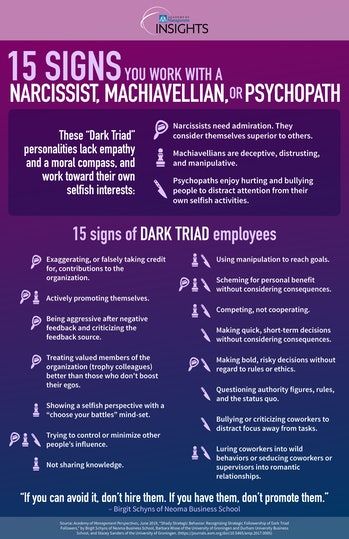 Narcissists are very successful in raising new narcissists. For the narcissistic parent, the child is another self-object, a vehicle for self-esteem. A demanding father drives his son around the sports sections and waits for the results at the national team level. The child is forced to live in the paradigm of imposed perfectionism: to study for only A's, to die for a red diploma, to play the violin. Children are left with no freedom of choice, as soon as the child goes beyond the boundaries of narcissistic expectations, as loving and warm parents suddenly turn into cold, stone monsters. This shapeshifting, depending on how "good" the child is, cannot but frighten him. Because of parental rejection, a child is introduced to an all-consuming shame from an early age.
Narcissists are very successful in raising new narcissists. For the narcissistic parent, the child is another self-object, a vehicle for self-esteem. A demanding father drives his son around the sports sections and waits for the results at the national team level. The child is forced to live in the paradigm of imposed perfectionism: to study for only A's, to die for a red diploma, to play the violin. Children are left with no freedom of choice, as soon as the child goes beyond the boundaries of narcissistic expectations, as loving and warm parents suddenly turn into cold, stone monsters. This shapeshifting, depending on how "good" the child is, cannot but frighten him. Because of parental rejection, a child is introduced to an all-consuming shame from an early age.
There is another thing: the narcissistic model when communicating with children is often chosen even by people with other accentuations. This is already a disease of society, environment. We are used to the fact that children should be demanded to the maximum, that it is impossible to love them just like that. In addition, this model is simple and understandable, like any trade and market relations: you give me a diary with fives, I give you love and recognition.
In addition, this model is simple and understandable, like any trade and market relations: you give me a diary with fives, I give you love and recognition.
Thus, the true core of the child's personality becomes unclaimed. All you need is a perfect projection. As a result, the future narcissist forms a flawed image of the "I", is not capable of empathy and dialogue. The void is filled with hypertrophied conceit, delusions of grandeur and overcritical perception of other people. The narcissist believes that he can only be understood and accepted by superhumans, and that he will not want to communicate with ordinary proles like you and me. He builds communication so that simultaneously receive praise and break those around him with coldness and excessive demands, just as once broke him.
2) Narcissistic injury - if in the first case we have a pure and homogeneous narcissistic character, then here we are talking about an event that pushes a person onto the path of narcissism, even if he is initially dominated by a different type of personality. As a rule, the narcissistic trauma is a sharp decrease in status, a hierarchical collapse, public humiliation, an attempt to take on impossible obligations. In almost every anamnesis there is unhappy love, rejection and rejection as the most powerful fixer of trauma.
As a rule, the narcissistic trauma is a sharp decrease in status, a hierarchical collapse, public humiliation, an attempt to take on impossible obligations. In almost every anamnesis there is unhappy love, rejection and rejection as the most powerful fixer of trauma.
Moving away from shock, a person begins to gain self-esteem back. Only now, increased anxiety, distrust and fear of addiction are added to all his relationships. He gradually grows into a manipulative narcissist, obsessed with improving his false self.
3) Narcissistic contagion - none of the psychoanalysts developed this concept, so I offer a little gag. My personal practice shows that very many people who find themselves in a narcissistic party begin to gradually adopt their behavioral patterns and motivations. A person first becomes a fan of a narcissist, and then tries to catch up with him. Damn Facebook, in my opinion, is literally built on the stimulation of narcissism, engaging in an endless race of achievements.
Narcissists, especially successful representatives, know how to poison other people with dependence on the fictional world of Bohemia. People are filled with poison when they try to fit into the immoral and meaningless world of narcissists, thinking that there is some profit waiting for them, some special treatment. There is a narcissistic streak in every person - each of us is vulnerable and can fall, blinded by egocentrism and a thirst for honors .
I have arranged the root causes in order of increasing success of the therapeutic intervention. That is, the narcissistic expansion is practically not treated and is not corrected, the narcissistic injury with sin in half can be cured, and the easiest way is to save the infected. It's like with drug addicts - to isolate from drug addict friends and dealers, survive withdrawal and prevent relapse.
Narcissus is easy to follow on social media. Usually, this is a superficial and pretentious type with a bunch of friends who rush to like his slightest sneeze.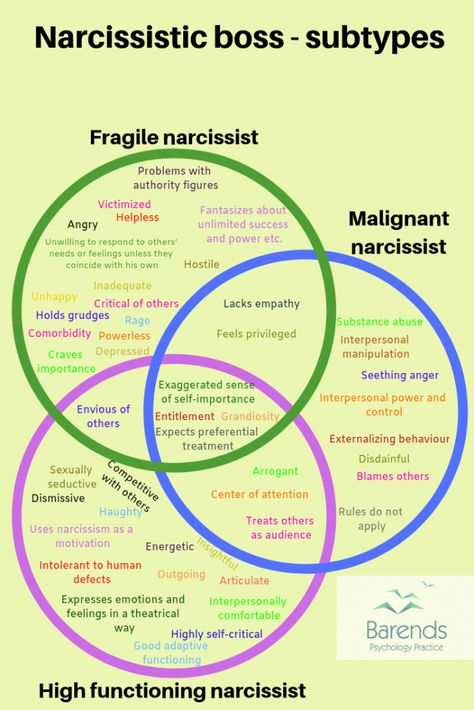
Signs
And now the traditional reminder "how to recognize a narcissist" of thirteen points.
1) The narcissist does not respond adequately to criticism. Suddenly, arrogance and the veil of superiority fall from him, and he begins to swear in public. He cannot answer a negative comment himself - this must be done by one of his company. Only then will the narcissist be able to stabilize his shaken self-esteem. Therefore a pack of sing-alongs immediately swoops down on the stranger, and they drive him out of his comfort zone in a crowd . After that, the news of the glorious victory will be inscribed in all public chronicles.
2) The narcissist is just asking for compliments. He demandingly waits for bragging rights, this is something like a rent for staying in his company. If you don't pay, it will quickly cool off.
3) The narcissist has a utilitarian attitude towards the people around him. He does not see them as independent subjects, therefore he often breaks into their lives, grossly violates their personal space.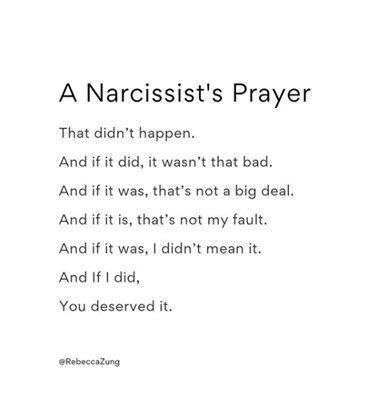 It is impossible to get emotional support from him . Most likely, he will be afraid of manipulation, break loose and declare that he himself needs it.
It is impossible to get emotional support from him . Most likely, he will be afraid of manipulation, break loose and declare that he himself needs it.
4) Envy wears out the narcissist. He tries to control the entire circle of his acquaintances. He keeps a close watch so that no one jumps off and gets carried away by someone besides him. In a love relationship, he is harassed by surveillance, control, and will constantly demand confirmation that he is the best and most beloved.
↓5) He is terribly afraid to show his true self. He is also afraid of any actions that can knock out a stool of cheap popularity from under him. He has a certain audience for which he works, and he will never go against it. At the same time, the higher the narcissist climbs, the worse and more unbearable he behaves. He believes that others tolerate him only for status, and therefore wants to check if they will love him if he starts acting like an asshole on a daily basis.
6) Narcissus boasts of diplomas and medals. He always gives a complete list of his awards. His thinking is also deformed: he evaluates people in the same way, whoever has more awards and other status achievements is cooler. They compare themselves to others all the time. It is not enough for them to succeed - this must happen against the backdrop of less successful comrades .
He always gives a complete list of his awards. His thinking is also deformed: he evaluates people in the same way, whoever has more awards and other status achievements is cooler. They compare themselves to others all the time. It is not enough for them to succeed - this must happen against the backdrop of less successful comrades .
7) Narcissists are easy to follow on social media. Usually, this is a superficial and pretentious type with a bunch of friends who rush to like his slightest sneeze. With the formed troupe, he tours all the resources where at least minimal support from the audience is required for promotion. The psychology of masturbation works here too: narcissists like themselves and repost any mention of themselves on the wall. And yes, they have a selfie stick. Here I need to write some vulgarity, but somehow I'm already tired.
8) For some inexplicable reason, narcissists believe they deserve special treatment: a personal touch, a separate line for sausages, a cherry on a cherry on a cake. They are never satisfied with the quality of service. If suddenly an official or a waiter treats them in the same way as hundreds of other visitors, narcissists feel wild resentment, which they do not hesitate to throw out in complaints books. Everyone should drop everything and take care of him alone.
They are never satisfied with the quality of service. If suddenly an official or a waiter treats them in the same way as hundreds of other visitors, narcissists feel wild resentment, which they do not hesitate to throw out in complaints books. Everyone should drop everything and take care of him alone.
9) They have one or two inviolable idols. If you try to say something against him, you will stumble upon the same inadequate reaction as if you were to criticize the narcissist himself. At the same time, the attitude towards idols is absolutely not critical, they rush about with the books of those who are considered great, and sell them from right to left.
10) They reduce any conversations to themselves and their topics. If someone shows pictures of their cat, then the narcissist will interrupt the discussion and will definitely jump in with his cat. If we are talking about creativity, then it will bury itself in the plots and texts of the narcissist. He simply does not know how to keep up a conversation about abstract things that have nothing to do with him personally.
11) Projects are rarely completed. They collapse under the weight of the obligations they have proudly placed on themselves. Yes, many narcissists are workaholics, but often this work is wasted. They do not know how to plan, they do not think beyond two moves, they are generally not able to adhere to any strategy, preferring to respond to momentary challenges. They spend all their energy on the current small things.
12) Narcissists never. Again. Never apologize almost never use the standard polite expressions “psib-please” because, due to the presence of such protection as omnipotent control, as well as a lack of empathy, they take everything for granted. They handed the plate to the narcissist - what, are there other options? In communication, they owe nothing to anyone.
13) Narcissus produces a heap of simulacra. To be in trend, he has to write reviews of popular films and books, uncomment colleagues in the narcissistic workshop in order to hope for reciprocal services. It quickly closes in a limited cultural space. Everything he does bears the stamp of secondary, chewed. But it’s hard to put your own “I” into work when this “I” does not exist at all.
It quickly closes in a limited cultural space. Everything he does bears the stamp of secondary, chewed. But it’s hard to put your own “I” into work when this “I” does not exist at all.
The narcissist sees himself as the root cause of everything. He attributes all accidents, all the free actions of other people to his own account.
Defenses
1) Idealization / devaluation - as we have already noticed, there are no halftones in the perception of narcissists. Narcissus in his own eyes is either a god or a nonentity. Surrounding - either idols of gold, or mounds of shit. And the stronger the idealization, the harder the exposure will follow. This leads to the need to constantly change the object of admiration, prevents the establishment of long-term relationships.
2) Omnipotent control - the narcissist sees himself as the ultimate cause of everything. He attributes all accidents, all the free actions of other people to his own account. In addition, narcissists see the world through the prism of romanticism: they have an idea of how any event should proceed, and what roles others should play. Puppet theater with princesses and unicorns.
Puppet theater with princesses and unicorns.
3) Projection — one's own negative intentions are attributed to others. If a narcissist hates himself, then it seems to him that others hate him and despise him. The use of projection worsens an already inadequate sense of interpersonal boundaries. For the same reason, there are a lot of homosexuals among narcissists. Narcissists are afraid of the opposite sex, maybe even jealous in some way. Fear of castration, envy of the phallus—well, you know all those Freudian mantras. The choice of a person of the same sex as a sexual object indicates the desire to have an ideal twin, who should not be afraid of .
4) Regression - a rollback into infantilism in frustration from a collision with the real world. The narcissist begins to avoid difficulties, hide from competitors, and generally needs the most primitive manifestations of love and affection. Needs are reduced to the most basic: to eat and sleep, in a dry, safe place. The narcissist can be capricious up to real psychosomatic illnesses.
The narcissist can be capricious up to real psychosomatic illnesses.
Kill the narcissist in you. No one should catch you on the desire to be inimitable and unique.
How to defend yourself
First of all, you must be aware that you are not at war with a person, but with a false image. It is impossible to defeat a fictional projection, don't even try. You need to keep yourself from becoming jealous of the narcissist, although he will do everything to realize this scenario. Demythologize, debunk, expose . If you believe even for a second in the fairy tale that the narcissist draws for naive viewers, you will put yourself at risk.
Kill the narcissist in you. No one should catch you on the desire to be inimitable and unique. It seems that it is worth getting close to a narcissist, and the whole world will see something in you that they have not noticed before. Yes, I want to partake of the narcissistic halo, to sip glory. But this is just an appearance. These are tantalum flours.
These are tantalum flours.
Narcissus is manipulative, although without a glimpse of brilliant innovation in this area. Most often, he provokes you to anger or other strong negative emotions with his arrogant and arrogant behavior. If you have a passionate desire to teach the bastard a lesson, then you are caught. You picked up the projection that the narcissist pushed out of himself and became exactly what he expected to see. Restrain yourself from the desire to immediately get involved in a skirmish for any joke. Even if twenty guard poodles of Narcissus later neighed over this joke. Another trick is to make you feel ashamed and inferior. Anyone who gets caught up in a Facebook image competition with a narcissist will spend a lot of time and effort creating an attractive façade that has nothing fundamental behind it.
Never get involved in a narcissist's projects, avoid work that will benefit him. He has a lot of grandiose plans, but what prevents you from concentrating on your business? Maybe they are not so exciting, but they are your . Try to clearly distinguish between interests, do not become an accomplice in dubious undertakings and startups.
Try to clearly distinguish between interests, do not become an accomplice in dubious undertakings and startups.
Defend your own borders fiercely to the point of scandal. It is necessary to protect your possessions from the invasion of a narcissist. Let him feel rejected every time, shame him, let the pain be incomparable with the feeling of power from penetrating into your personal space. It may take several iterations, but, sooner or later, you will be able to defend the autonomy, and the narcissist will go in search of easier victims. Don't bend over on this issue. Don't like the idea of counter-aggression? Do you want to save face and good relations with a narcissist and his gang? Then read some other method, somewhere for sure there is a "Method to please" in the spirit of old Carnegie .
Do not try to moralize, appeal to conscience - the narcissist does not suffer from this. This is a whole, but at the same time undeveloped personality, and it is best to subdue it through pain. And the absence of pain is like an encouragement. The tactic of open protest is one of the best self-defense options for a narcissist.
And the absence of pain is like an encouragement. The tactic of open protest is one of the best self-defense options for a narcissist.
Narcissus is an attacking type, he himself is used to manipulating. Therefore, countermanipulative schemes work much better with him.
How to manipulate
Manipulating a narcissist is quite difficult, because he runs into his selfish needs and refuses to move away from them. If you want something to be done, let it be done in public. Let the narcissist, if he helps you, get some symbolic points. Never try to manipulate a narcissist on the basis of an interpersonal carrot and stick - external evaluation will always be the dominant factor.
If you rise in society, sooner or later you will have to go through a layer of narcissistic personalities. Let's say our media sphere is made up almost entirely of narcissists, although many of them are infected and not original. Take advantage of the fact that the narcissist perceives other people as self-objects. If he likes you in some way, he will drag you into his circle and advertise. As a thing, as a personal find - but is it really that important? You can easily enlist basic support from his like-minded people. And there it is not difficult to throw off the narcissist himself, because, as a rule, he is not very productive and is too busy with flattery and intrigues. Strength is valued in this circle, if you demonstrate great toughness, then the narcissist's mongrels will easily betray him and come over to your side. This is generally a common practice in narcissistic communities, so there is an off-scale degree of distrust. All of them are boiled in one cauldron, in which caramel and pus are equally divided.
If he likes you in some way, he will drag you into his circle and advertise. As a thing, as a personal find - but is it really that important? You can easily enlist basic support from his like-minded people. And there it is not difficult to throw off the narcissist himself, because, as a rule, he is not very productive and is too busy with flattery and intrigues. Strength is valued in this circle, if you demonstrate great toughness, then the narcissist's mongrels will easily betray him and come over to your side. This is generally a common practice in narcissistic communities, so there is an off-scale degree of distrust. All of them are boiled in one cauldron, in which caramel and pus are equally divided.
A narcissist can be made addicted in two ways. Or through envy, here you need to have an image and support stronger than his. Or through his need to control and manage: be the elusive and beautiful butterfly that an avid collector tries in vain to catch.
Narcissus is an attacking type, he himself is used to manipulating. Therefore, countermanipulative schemes work much better with him. The clearer your consciousness, the clearer you see the background of what is happening, the stronger you hold on to your own interests, the easier it will be for you to cope with a narcissist.
Therefore, countermanipulative schemes work much better with him. The clearer your consciousness, the clearer you see the background of what is happening, the stronger you hold on to your own interests, the easier it will be for you to cope with a narcissist.
Wear down the enemy, the daffodil is not imprisoned for trench warfare. He needs quick one-time wins. One of the problems of the narcissist is the wrong distribution of forces and resources.
How to kill
Curiously, a narcissist is much easier to kill than to manipulate. There are so many ways to cut it with a razor. Laughter, as I have repeatedly said, is a terrible weapon, but against a narcissistic personality it is impressively effective. Ridicule is the best strategy for dealing with a narcissist , the more people join the laughter, the better. Chase and harass him with banter. But, I ask you, let it really be funny, sharp and smart. Otherwise, you will drown in the mudflow of vulgar libels, which is massively practiced on graphomaniac resources.
Is the narcissist breaking boundaries? Answer him the same. Ignore the false personality, try to get to the real "I" with a red-hot iron, expose the existential emptiness of the narcissist. Take advantage of the fact that the narcissist does not have his own development strategy, he is always busy responding to everyday events and requests. You will beat him in the long run, you just have to wait for the depressive phase when the narcissist eats away at himself with doubts. And sooner or later she will come, you just need to catch this moment and put pressure on it. The narcissist is helpless against the strategy of sustainable development that a person with adequate self-esteem uses.
Pull the narcissist into communities where he has no support, pull him into new situations. Narcissists are somewhat similar to chameleons, they are super-adaptive to the external environment. Let the external environment be something unpredictable and chaotic. It's like putting a chameleon on sheets of multi-colored paper and once a minute pulling out the sheet, forcing it to change color again. He will quickly go crazy.
He will quickly go crazy.
Narcissus, burdened with real power, is best not to mess with as long as you are in his jurisdiction. However, if he cannot exert any administrative pressure on you, then he can be dealt with just as easily as other narcissists. Even a narcissist who has achieved everything in the world will still be dependent on external evaluations and dissatisfied with his position. If there is no escape from the narcissistic boss, then it is easier and more profitable to become his favorite. If you can’t become a favorite, then try to get yourself maximum autonomy and enlist the sympathy of your colleagues. In this case, the narcissist will be afraid to touch you so that other workers do not perceive him as a petty vindictive dirty trick. He doesn't understand that in fact, no one cares about , he always feels like in public, and this should be used.
Finally, repeat the narcissistic trauma, if any. Reject it, drop it, humiliate it. In the community of narcissists, the one who manages to throw a partner first wins.
Wear down the enemy, the daffodil is not imprisoned for trench warfare. He needs quick one-time wins. One of the problems of the narcissist is the wrong distribution of forces and resources. Because of this, he is quickly out of breath. Try to cut him off from the support group. If the narcissist is left alone with you, then it is enough to portray not even contempt, but indifference, and he will quickly come to naught. Just don't fall into the traps of the illusory world of success.
In conclusion, I will say that narcissists are only as strong as you have not overcome narcissism in yourself . He can be both a very dangerous opponent and a paper tiger, and it depends not on him, but on you. Other psychotypes are a threat in themselves, but the narcissist is terrible only because he draws you into a fruitless competitive activity and into an airless space of mutual pleasing. Before you go on the warpath, defeat the narcissist within yourself, and then not a single narcissist can harm you from the outside.
How to work with narcissists: advice from a psychiatrist
Anton Bakharev
When faced with unpleasant or strange behavior from colleagues, we either give up or lose patience and lose our temper. What can you do to make your life easier? Psychiatrist and business consultant Jodie Foster talks about 10 "problem" personality types and gives specific advice on how to deal with difficult situations in the book Assholes Under Control.
Consider one of the most common of them and its three varieties.
Narcissism
Narcissism itself is not bad. In psychiatry, this concept comes down to high self-esteem. This trait is essential for new beginnings and success. Narcissism is one of the core qualities of the human experience. However, going beyond the reasonable, it becomes a problem.
Healthy narcissism helps us get into law school, enroll in guitar classes, or get our first date. Without faith in yourself, it is impossible to dream or make plans.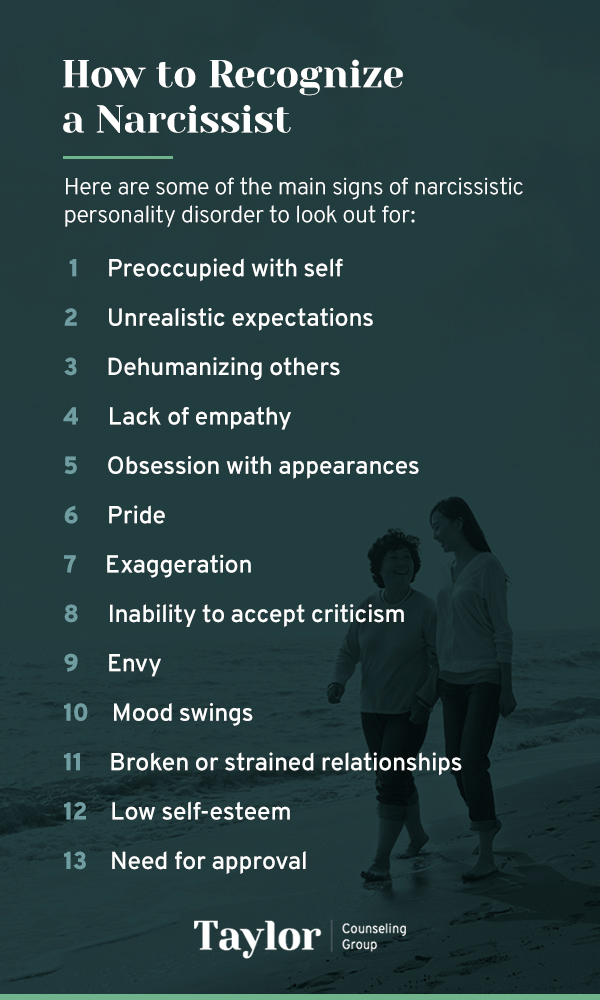 Lack of a healthy dose of narcissism makes us think something like, “I won’t go to law school. I'm too stupid", "I'll never learn how to play the guitar" or "Yes, she'll piss me off."
Lack of a healthy dose of narcissism makes us think something like, “I won’t go to law school. I'm too stupid", "I'll never learn how to play the guitar" or "Yes, she'll piss me off."
Narcissism becomes uncontrollable, impudence, egocentrism, arrogance begin to dominate. In other words, the ego comes to the fore and is fueled by praise and vanity. Problems with narcissism appear when a person becomes unable to ask for help, first dates don't turn into second dates, and guitars break if they don't sound right after a week of practice.
Narcissistic disorders affect approximately 6.2% of the population (a very high rate) and 50-75% of them are men.
All types of Narcissists have a very fragile personality behind their blatant arrogance, in desperate need of recognition. Where a person with healthy self-esteem feels good, the Narcissist tries to compensate for the lack of confidence. An ordinary person stands firmly on his feet and can praise himself from time to time. The narcissist needs the constant approval of others. In everyday life, we perceive Narcissists as people with too high conceit. In fact, they only seem to be focused on themselves. This is a defensive reaction, the causes of which lie in low self-esteem.
The narcissist needs the constant approval of others. In everyday life, we perceive Narcissists as people with too high conceit. In fact, they only seem to be focused on themselves. This is a defensive reaction, the causes of which lie in low self-esteem.
Narcissist "beloved"
How do "beloved" Narcissists manifest themselves in a team? For example, they may be adept at asking for compliments. Appearing in the office in full dress, they hint that they overslept and put on the first thing that came to hand. This is said to get a portion of admiration: “You have a beautiful haircut and a great shirt! And in general, you always look good.” Sounds like "You are our beloved!"
Not only Narcissists can ask for compliments, but this tactic is typical for people with low self-esteem. The praise of others lifts their spirits. Of course, we all talk about ourselves from time to time, but the “beloved” Narcissist tends to do this endlessly. "I did this and that." "I have this.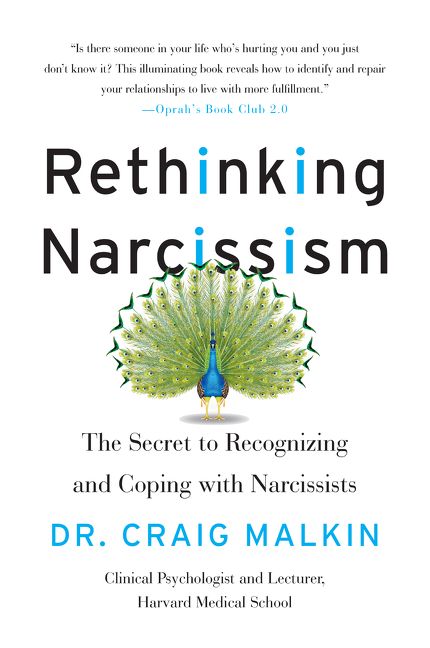 " "I'm going to buy something." And we are already thinking in desperation: “He is on his own again…” Sidelong glances, heavy sighs of colleagues are signs that they are again hearing an endless monologue about themselves.
" "I'm going to buy something." And we are already thinking in desperation: “He is on his own again…” Sidelong glances, heavy sighs of colleagues are signs that they are again hearing an endless monologue about themselves.
You try to react, but Narcissus grabs all your remarks like prey and feeds them to his stories. “Yes, yes, it reminded me how I…” This is how Narcissus feels important. He seems to be calling: "Pay attention to me!" It seems to him that people are interested in listening to him, that he entertains society with stories about his own achievements. A narcissist is unlikely to take an interest in your affairs, and if he asks anything, it is only in the hope of getting a short answer. He also forgets everything you told him about yourself.
They say about such people: “He listens only to himself.” At the same time, to emphasize their superiority or hurt someone's pride, the Narcissist may bury his head on the phone or paint his nails when others are talking. Such behavior seems to tell us: “I don’t have to delve into this. I do not need it. I am above it."
Such behavior seems to tell us: “I don’t have to delve into this. I do not need it. I am above it."
If you managed to insert at least a few words about yourself in a conversation with a Narcissist, you are likely to fall out of favor and be criticized. “Well, I think it’s good for you… If I needed it, I would do it, but I don’t like such things…”
Their achievements are diamonds, yours are mere coals.
In a sense, this is a standard strategy for maintaining an advantage. You say that you are doing something - he says that he does it better. The narcissist may even accuse you of being jealous or otherwise undermine your authority by elevating himself.
These people are very fond of expressing insults in the form of a joke.
“I was hoping they would send me a prettier assistant,” Narcissus chuckles, making the person feel helpless and hurt.
Another tricky tactic is to quickly change the topic of conversation so that you don't have time to mention your accomplishments. It seems quite innocent to remark like “I heard they are going to change the elevators in the building,” made suddenly after your story about your recent success. In fact, it is unsettling and may mean that Narcissus has appeared in your office.
It seems quite innocent to remark like “I heard they are going to change the elevators in the building,” made suddenly after your story about your recent success. In fact, it is unsettling and may mean that Narcissus has appeared in your office.
The main concern of the Narcissist (the essence of this personality type) is to maintain his significance and confidence. Therefore, he avoids open competition: God saves the safe. Failure, especially public failure, is a heavy blow for Narcissus. For fear of failure, he also avoids more covert competition. For example, does not take on big projects or does not ask for a raise for fear of not living up to expectations. Better not to fight and convince yourself that you would win it than to try and fail.
Narcissist "unhappy"
Narcissist "unhappy" manifests itself differently than Narcissus "beloved", but the gap between external confidence and low self-esteem remains unchanged. The indulgence of one's desire to receive comfort from Narcissus "unfortunate" is stronger than the unshakable arrogance of Narcissus "beloved".
He can describe in detail how the doctor assured him that he had never seen such a severe manifestation of carpal tunnel syndrome before. Moreover, even talking about health problems, he manages to be self-centered and narcissistic.
The “unhappy” narcissist seeks approval by uniting people who are ready to support him. So he can remain popular, and his name is well known. And all in order to please people, to be loved and respected, to hear approvals that support his self-esteem.
The "impossible" narcissist
The "impossible" narcissist is simply unable to think of anything but himself. This type has an extremely low level of empathy. He always blames others for his troubles and considers himself right in everything. No interventions or life tests help him recognize his behavior patterns. Such people prefer either not to have relationships at all, or to continue them within well-defined boundaries. While other Narcissists may at times be aware of the deep roots of their insecurities, the "impossible" Narcissist doesn't even think about them. This is his self-defence. He guards his self-esteem by not allowing negative thoughts about himself. This defense mechanism does not allow him to perceive criticism and see his shortcomings, and therefore excludes the desire to correct them. If you have an “impossible” Narcissus in your team, then it is unlikely that he will stay for a long time. The depth of his problem does not allow him to gain a foothold in the workplace.
This is his self-defence. He guards his self-esteem by not allowing negative thoughts about himself. This defense mechanism does not allow him to perceive criticism and see his shortcomings, and therefore excludes the desire to correct them. If you have an “impossible” Narcissus in your team, then it is unlikely that he will stay for a long time. The depth of his problem does not allow him to gain a foothold in the workplace.
What it takes to work successfully with a Narcissist
- Be generous with compliments. This will help the Narcissist relax and prevent outbursts of anger.
- Insert comments, suggestions or criticism between praises. Then Narcissus will be able to hear her.
- Respond promptly to requests and invitations from Narcissus. Try not to ignore it.
- If possible, do not create situations in which the Narcissist can appropriate your merit or put you in a bad light.
- Invite the Narcissist to take the place of another person or look at their emotions from the side.
